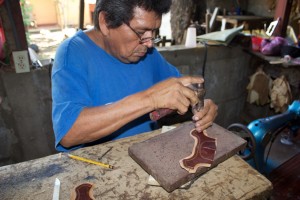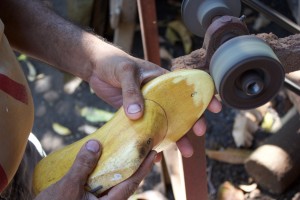
A BYU student is using stylish shoes to give Nicaraguan shoemakers the opportunity to improve their circumstances.
Bryce Herman’s company, Tuani, provides classy yet casual shoes and needed employment for shoemakers in Nicaragua. Herman’s idea originated while he was in Nicaragua teaching business classes. While searching for a professional but not formal shoe, he met Jairo, a native shoemaker.
“Jairo seems serious, but he’s rather soft and jolly when you get to know him,” Herman said. “He fought in Nicaragua’s revolutionary war, and has been making shoes since he was 16. He also was recently diagnosed with colon cancer and is currently undergoing chemotherapy.”
Herman studied business at BYU and has a passion for entrepreneurship. Before going to Nicaragua, Herman interned with a nonprofit in Mexico. This experience inspired him with the idea to create his own nonprofit, which led him to Nicaragua.
“I want to create a nationally recognized shoe brand and provide consistent, meaningful employment for as many Nicaraguans as possible, allowing them to rise above their current economic situations,” Herman said. “I want to create my own program and run a sustainable organization that would provide employment and spur economic development.”
Herman and Jairo discussed the vision for the shoe and Herman was blown away by the product Jairo created. Although Jairo’s shoemaking shop is small, it has led to amazing opportunities and a unique shoe style. Jairo’s workload has increased and he has hired new workers to help manufacture the shoes. Meanwhile Herman has been contacted by other Provo start-ups and even GQ Magazine. The stylish, durable and low-profile shoe caught the attention of Nicaraguans, BYU students and pop culture gurus. When Herman returned to BYU he received several comments on his shoes.
Tuani’s growth has provided important employment opportunities in Nicaragua. According to the CIA’s World Factbook, Nicaragua is the poorest country in Central America and the second poorest country in the Western Hemisphere. A considerable 42.5 percent of the population is under the poverty line. Each Tuani sale provides a positive social impact by providing stable jobs for local Nicaraguans.
“This may not be the case in all instances, but have an effective social impact is often more difficult than expected,” Herman said.

The shoemakers that make a consistent wage working for Tuani can provide their family with essential items, and the wages they receive circulate into the country’s economy. Since Tuani’s manufacturing headquarters is in Nicaragua, as Tuani grows new air is breathed into the economy. Employment opportunities for Nicaraguan shoemakers have increased as Tuani continues to expand. Work isn’t consistent for the shoemakers, but with the jobs they receive by working with Tuani, they can provide for their families, give back to their local community and train and hire other skilled Nicaraguans.
“The shop is super hot and super primitive, but it is brought to life by all the cobblers. They constantly joke around with each other, laugh, and sing,” Herman said.
The company’s name derives from the word Nicaraguans use to say awesome, cool or sweet — “tuanis.” In Nicaragua the “s” is aspirated, so the company took on a name that ties back to the place where it began.
Herman returned to BYU after his initial trip in 2013 and continued to receive comments about his Nicaraguan-made shoes, he felt that it could turn into a business. He knew it would be difficult to ship large amounts of shoes in a short period of time because the shoes are custom made in Nicaragua and the shoemakers don’t use any mechanized tools. Tuani launched a campaign on Kickstarter with a $8,000 goal and a deadline for Feb. 26, 2015. The campaign quickly received support; Tuani more than tripled its goal and raised $25,305 from 257 backers.
Tuani published stretch goals on Kickstarter that motivated backers while campaigning. The company released new shoe styles with fun names like the Black Gatsby and the Rugged Red Gatsby.
Challenges establishing a brand and creating marketing strategies included contrasting styles from the shiny shoe that most men are accustomed to. Communication with the shop was difficult at times due to the 3,000 mile separation between the founders and the shoemakers.
“We kept our motivation high by focusing on the difference we could make in Nicaragua and the joy of starting our own business,” said Cody Bringham, a BYU student who participated in the beginning stages of Tuani but is no longer with the company.
Bringham explained that the experience has been “priceless.” “We’ve been able to learn so much about entrepreneurship that will help us to succeed in whatever we do throughout our lives.” Bringham continued. “We encourage anyone with the desire to start a business to just take the leap.”
The shoes range from $70 to $80 and are popular with male college students who prefer a durable and stylish shoe. Most importantly the profits help provide the Tuani shoemakers with a consistent and liveable wage — something that is rare to find in Nicaragua.
“It is definitely difficult to have a social mission and seek to generate significant profits, but it is worth it. The social side provides depth to a business that makes its competitive angle more sticky and compelling,” Herman said.
With increased funding, heightened support and a determination to create a positive social impact, Tuani will continue to provide cool shoes for an awesome reason.




